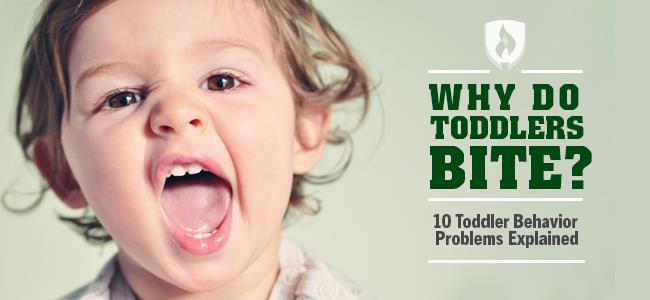
Toddlers — they’re the Wild West of children and they’re sure to take you for the ride of your life. Whether you’re raising one yourself or working with a gang of rambunctious rugrats, they never fail to surprise.
Why do toddlers bite? Why do they delight in throwing their toys? And what secret joy do they find in resisting bedtime? These are the mysteries that remain in our modern age. Lucky for you, we’re here to uncover why tots do what they do and how you can address toddler behavior problems for good.
10 Toddler Behavior Problems Explained
1. Biting
Why do they do it?
Yeeeouuuch! Have you ever felt the sharp pangs of a toothy toddler sinking those baby teeth into you? You’re definitely not alone. Biting is common amongst babies and toddlers. Babies may bite to alleviate the pain of teething and to explore with their mouth. On the other hand, toddlers and young children may bite for a variety of reasons:
- They may bite to express feelings they don’t know how to communicate.
- They bite experimentally to see what reaction they can invoke.
- If they’re feeling neglected, they may bite to get attention.
What you can do:
If you discover teeth marks on a child or see the biting go down in person, comfort the victim first. You may need to clean and dress the bite, depending on the severity of it. Tell the biter that biting is not allowed and that it hurts their friend or family member. Teach them to say “No!” or “Stop!” instead of biting before redirecting them to a different activity.
2. Throwing tantrums
Why do they do it?
Tantrums are another mode of expression for toddlers. They may grow frustrated with their limited vocabulary, which sometimes cannot convey what they want to express. When frustration builds, tantrums explode. Hunger, exhaustion and over-stimulation can also trigger tantrums.
What you can do:
It’s tempting to cave in to a toddler’s demands during a meltdown, but you need to stay calm. Move the toddler to a quiet space for them to get a hold of themselves and explain that to them. Stay with them to make sure they don’t hurt themselves in the process. After the storm has passed, encourage them to explain their feelings.
To prevent tantrums, know what makes the toddler tick — whether it’s getting tired in the afternoon or transitioning between activities. Tell your toddler ahead of time what they can expect to do next, or intervene when you see the tot getting worked up — divert their attention with a toy or give them choices for a sense of control.
3. Throwing items
Why do they do it?
Throwing is a newly acquired skill to a toddler — one that takes fine motor skills and hand-eye coordination. Throwing items is both exciting and experimental for toddlers — it allows them to see what happens to objects they release. That’s why you’ll see everything from toys to food go airborne.
What you can do:
Approach the throwing issue with a “chaos control” mindset. The toddler will continue to throw, but it is up to you to teach them which objects can be thrown, such as balls and Frisbees. If they’re throwing items out of anger, take the item away and ask them to explain their feelings.
4. Running away
Why do they do it?
The minute you set them down they bolt, zigzagging on unsteady feet in any direction away from you. It can be alarming in public and a safety issue too. Toddlers aren’t running away to avoid you — they’re running because they love the feeling. Their newly acquired running ability and desire for independence make for a marathon of a combination.
What you can do:
Allow your toddler to run in a safe, open space where you can observe. If that’s not an option — like when you’re running errands — you’ll have to distract them. Have a toddler assist you with a task to empower them. A stroller is a good option, but keep them engaged with a toy so they don’t feel too restricted.
5. Screaming
Why does it happen?
If you feel like your ears are going to shatter from toddler shrieks, squeals and screams, remember that it’s just another way for a toddler to enjoy and experiment with a new skill. Additionally, because of their limited vocabulary, toddlers may feel screaming is the only way to get their point across.
What you can do:
Never yell at your toddler to stop yelling. Set a good example by speaking in a quiet voice and turning down TV or music. Praise them when they use a quiet voice. Try whispering to them to catch their attention, and remind them about “indoor” and “outdoor” voices. If your toddler is being unruly in a public setting, such as a restaurant, take them outside to get their “outside” voice out of their system.
6. Interrupting
Why does it happen?
Whether you’re talking to the neighbor or on an important phone call, toddlers don’t care. They want your attention now! A toddler’s short-term memory isn’t well developed, and combined with their poor impulse control, the urge to get your attention immediately is irresistible.
What you can do:
Interrupting behaviors plague toddlers, and unfortunately this doesn’t improve until the age of three or four. To combat interruptions in toddlers, approach with a “distract and divert” mindset. When a toddler tries to interrupt, acknowledge them by squeezing their hand and continuing on. Provide them with a toy or activity, such as a video, to divert their attention for the time being. And remember to always set a good example by not interrupting — toddlers learn by observation.
7. Hitting & aggressive behavior
Why does it happen?
While it may appear out of place for toddlers to exhibit aggression, rest assured that it is a completely normal part of the toddler experience. With a combination of impulsiveness and underdeveloped language skills, toddlers may act out their feelings in hitting or other aggressive behavior.
What you can do:
Declare a minute long timeout for a toddler that hits or is misbehaving. Consistency is key for setting behavior standards. Remove the toddler from the altercation to call down and with time they will understand their behavior and its consequences.
8. Hair pulling
Why does it happen?
Similar to hitting, hair pulling can sometimes be an expression of frustration that they can’t put into words. It can also be a curiosity — hair pulling always results in an instant reaction for the toddler.
What you can do:
React to hair-pulling like you would to hitting. Pull the toddler aside and implement a minute-long timeout. Let them know that the hair pulling is not OK and that it hurt their friend or family member. You may want to offer the toddler an alternative, such as a stuffed animal, to take their aggression out. You can also play “hair stylist” to show them how to treat hair the right way.
9. Picky eating
Why does it happen?
The world’s best chef couldn’t make a dish your toddler would eat — and you’re definitely not alone. Many toddlers exhibit picky eating, which can make dinnertime a nightly headache. Toddlers may defy dinner as an attempt to exert control and independence. Some may have sensitive taste buds that enjoy only bland foods. Some just don’t like change, including new foods.
What you can do:
Inspire toddlers to eat by eating the dish yourself as well. Have the toddler join the “One Bite Club” to try new foods. Often, picky eaters are also slow eaters, so give them the time they need to mull through the meal. And the meal may be better received if you give them a choice in the food selection.
10. Bedtime resistance
Why does it happen?
It seems like resisting bedtime is hardwired into a toddler’s DNA. Even through the yawns and eye rubbing, toddlers fight for their right to stay awake. Ever curious toddlers don’t want to miss out on the action while everyone else gets to stay awake. And by resisting bedtime, they also attempt to assert their budding independence. It’s a way for them to gain a sense of control.
What you can do:
Create a nightly routine so your tot will know just what to expect. You can give them simple choices, like choosing between two books to read, to give them a sense of control. And once the lights are off, resist the urge to come running immediately when they call.
Now you know…
Why do toddlers bite? No, they’re not vampires … although they can be just as terrifying at times. Toddlers are mystifying, hilarious, frustrating and loveable all at once. But remember — you are the adult and ultimately in charge.
Your reactions to these toddler behavior problems can pave the way for smoother sailing to come. You’ve got this parenting thing down — perhaps becoming a teacher is a step to consider. See why in “Teaching Toddlers: 10 Reasons Parents Make Great Teachers.”
RELATED ARTICLES:




